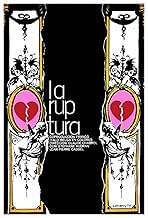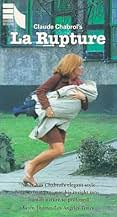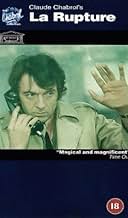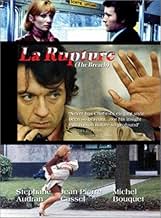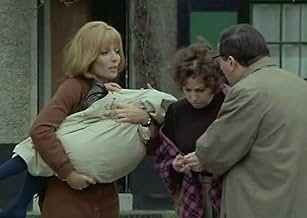Agrega una trama en tu idiomaA father injures his son. He moves in with parents who blame the child's mother. They hire someone to find info about her for an upcoming custody hearing. He and girlfriend secretly lodge at... Leer todoA father injures his son. He moves in with parents who blame the child's mother. They hire someone to find info about her for an upcoming custody hearing. He and girlfriend secretly lodge at her boarding home to undermine her life.A father injures his son. He moves in with parents who blame the child's mother. They hire someone to find info about her for an upcoming custody hearing. He and girlfriend secretly lodge at her boarding home to undermine her life.
- Dirección
- Guionistas
- Elenco
- Premios
- 1 nominación en total
- Mme Humbert - la première parque
- (as Margot Lion)
- Dirección
- Guionistas
- Todo el elenco y el equipo
- Producción, taquilla y más en IMDbPro
Opiniones destacadas
The story itself is another virulently acerbic "thriller of manners" for Chabrol, capturing with Flaubertian honesty the farce upon which class distinctions are built. Other than Clouzot, I've always felt that Chabrol's work comes closest to Bunuel's (no surprise that Cassel and Audran would also feature in Discreet Charm Of The Bourgeoisie)- he brings a blowtorch to insipid, self-satisfied, hypocritical civilization, and dares to gaze into the vacuous abyss beneath. Like Bunuel and Fassbinder, he does this with consummate style and infuses his films with cruelly ironic wit.
Chabrol's films are always unnerving to watch because they come too close for comfort, and never allow us to be self-satisfied. He asks some terribly important questions: at what price are bourgeois myths of propriety, morality and civilization bought? In "The Unfaithful Wife", murder is necessary to sustain the idyll, while this movie offers a profound dissection of bourgeois identity- in order for bourgeois "decorousness" and privilege to survive, it must posit an Other, the sordid, vulgar, ill-educated boor, even if it doesn't exist. Throughout "La Rupture" the viewer witnesses the creation of these supposed "absolutes", the unfurling of the absurd narrative that legitimizes bourgeois entitlement- sully, tar and feather the peasant, the Other. Like homophobia, class prejudice is only an expression of the precariousness of identity, without an opposite to define oneself against, the suppositions invariably crumble.
Chabrol is an acutely intelligent, courageous and singularly brilliant film maker. Don't miss this deconstructive masterpiece...as an examination of class, I think only "La Ceremonie" would surpass this one.
ps i can't help but wonder if the eccentric, insular boarding-house here is an homage to balzac's maison vauqeur in his incomparable "Old Goriot"- both the altruistic doctor (Bianchot) and the moustachioed, absurdly eloquent tempter (Vautrin) are parodied/mirrored here
The film doesn't contain a great deal of excitement in the common thriller sense, but Chabrol keeps his audience on the edge of their seats by way of the characters and the atmosphere. The film centres on a boarding house and the people that live there; and the interaction between them makes up the bulk of the film. The main theme on display is an attack against the rich; this comes through plainly and obviously through the character of Ludovic Régnier; a man who has enough money to always get what he wants and not care about who gets trampled in the process. The outlook of the film is very bleak all round and Chabrol seems keen to show the dark side of human nature as much as possible. The central plot line, which involves a man trying to prove that an upstanding woman is an unfit mother by any means necessary, is very bleak in the way it plays out. As ever with Chabrol, the acting is excellent and he has put together a great cast here that includes his then wife and frequent muse, the beautiful Stéphane Audran in the lead role and a support cast that features superb performances from the likes of Jean-Pierre Cassel and Michel Bouquet. The film has a very unique style that fluctuates throughout; as mentioned, the first five minutes or so almost seem like something out a zombie movie and then it moves into more familiar Chabrol territory before changing again for the climax as the director gives us a very strange and striking hallucination sequence. Overall, this is an excellent thriller that comes highly recommended and I may even rate it as Chabrol's best.
The couple start arguing and, just as the man seems about to slap the woman, he grabs the kid and literally throws him clear across the room; the latter hits his head violently against the edge of a kitchen cupboard and lands in a bloody puddle on the floor! It is a thoroughly shocking sequence – not just because it is totally unexpected and comes so early in the film but also since this utterly vile act is committed by a father upon his own son! Previously, I had equally gasped at a similar deed featuring in Ingmar Bergman's influential period piece THE VIRGIN SPRING (1960) but, again, the blood link between abuser and abused here makes the action all the more reprehensible.
Actually, the film's original French title, LA RUPTURE, should from the outset have been more suggestive to what was in store for the perceptive viewer and, indeed, can be interpreted to allude to various characters and events: the dissolution of the couple's socially incompatible marriage; the gash in the kid's head (he is confined to a hospital bed for the duration of the film and is never again seen in a conscious state); the wrecking of the illusory brashness with which down-on-his-luck mole (Jean-Pierre Cassel, effectively cast against type) callously spins a web of deceit around Audran in a frame-up engineered by her all-powerful father-in-law (Michel Bouquet, also uncharacteristically portraying a villain) to ensure the custody of his grandson; and, at the film's conclusion, the cracking of Audran's very sanity – not only through the incredible events happening around her, but also because of her unwittingly imbibing a drug-spiked orange juice drink concocted by Cassel!!
And what about the breach in Chabrol's own stylistic approach to such archetypal material, taking in as it does a healthy dose of black comedy (the eccentric inhabitants at the foreclosing boarding house where Audran and Cassel install themselves – including three elderly tarot-playing snoops, delusional thespian Mario David, boozing landlord Jean Carmet and his bespectacled, "backward" daughter Katia Romanoff), sleazy bedroom antics (courtesy of Cassel's perennially nude and horny girl played by the delectable Catherine Rouvel) and even outright psychedelia (Audran's kaleidoscopic vision of friendly balloon vendor Dominique Zardi)! Evidently, Chabrol wears his well-documented Fritz Lang influence on his sleeve even in this case! For the record, the film under review is based on a novel by Charlotte Armstrong, of whose works Chabrol would later also adapt MERCI POUR LE CHOCOLAT (2000).
The first-rate ensemble cast also boasts a handful of other notable names: Michel Duchassoy (star of that which is arguably Chabrol's finest achievement, 1969's THIS MAN MUST DIE – appearing here as Audran's sympathetic lawyer), Angelo Infanti (as the doctor treating Audran's son and a lodger in her peculiar dwelling) and even Belgian director extraordinaire Harry Kumel (who, I am ashamed to say, I did not recognize even though I know how he looks today from recent photographs and past DVD supplements!). As always with Chabrol during this major phase in his career, the impeccable accomplishments of cinematographer Jean Rabier and composer Pierre Jansen (who contributes a strikingly unsettling score) can never be underestimated.
Incidentally, Audran and Cassel would later appear as an oversexed married couple in Luis Bunuel's THE DISCREET CHARM OF THE BOURGEOISIE (1972) and, again, in Chabrol's star-studded THE TWIST (1976) which, ironically, is reputed to be his nadir(!) – and, of course, Audran and Bouquet also played husband and wife in Chabrol's THE UNFAITHFUL WIFE (1969; which, like THE BREACH itself, can be counted among Chabrol's Top 5 movies) and JUST BEFORE NIGHTFALL (1971); besides, probably as a result of this same Franco-Italo-Belgian co-production, Bouquet and Cassel would themselves be subsequently engaged to participate in Harry Kumel's own exhilarating magnum opus, MALPERTUIS (1971).
¿Sabías que…?
- TriviaClaude Chabrol once stated that the bus scene where Hélène (his wife Stéphane Audran) tells her family's story to the lawyer (Michel Duchaussoy) was the occasion when he finally thought that Stéphane had become an actress.
- Citas
Opening Title Card: [from the French] But what thick night suddenly surrounds me? JEAN RACINE
- ConexionesReferences Los invencibles (1969)
Selecciones populares
- How long is The Breach?Con tecnología de Alexa
Detalles
- Fecha de lanzamiento
- Países de origen
- Idioma
- También se conoce como
- The Breach
- Locaciones de filmación
- Productoras
- Ver más créditos de la compañía en IMDbPro
- Tiempo de ejecución
- 2h 4min(124 min)
- Mezcla de sonido
- Relación de aspecto
- 1.85 : 1

